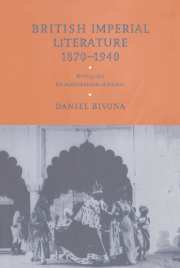Book contents
- Frontmatter
- Contents
- Acknowledgments
- Introduction
- 1 Agents and the problem of agency: the context
- 2 Why Africa needs Europe: from Livingstone to Stanley
- 3 Kipling's “Law” and the division of bureaucratic labor
- 4 Cromer, Gordon, Conrad and the problem of imperial character
- 5 T. E. Lawrence and the erotics of imperial discipline
- 6 Resurrecting individualism: the interwar novel of imperial manners
- Conclusion: work as rule
- Notes
- Bibliography
- Index
3 - Kipling's “Law” and the division of bureaucratic labor
Published online by Cambridge University Press: 02 December 2009
- Frontmatter
- Contents
- Acknowledgments
- Introduction
- 1 Agents and the problem of agency: the context
- 2 Why Africa needs Europe: from Livingstone to Stanley
- 3 Kipling's “Law” and the division of bureaucratic labor
- 4 Cromer, Gordon, Conrad and the problem of imperial character
- 5 T. E. Lawrence and the erotics of imperial discipline
- 6 Resurrecting individualism: the interwar novel of imperial manners
- Conclusion: work as rule
- Notes
- Bibliography
- Index
Summary
For when the gentiles, which have not the law, do by nature the things contained in the law, these, having not the law, are a law unto themselves: Which shew the work of the law written in their hearts, their conscience also bearing witness, and their thoughts the mean while accusing or else excusing one another.
Romans 2: 14—15Although not a colonial official himself, Rudyard Kipling, when he returned to India in 1882 to become sub-editor of the Civil and Military Gazette in Lahore and begin his career as a serious writer of fiction, found himself among hordes of English who were. In fact, the note of defensive self-assertion which sounds through Kipling's “know-it-all” attitude in his early writing seems to serve a dual purpose: to represent in fictional form the attitudes so common among the types of English officials he knew in India, and to express a more complicated, if somewhat transparently desperate, longing for the expert knowledge usually available only to credentialed bureaucrats. Not only do many of Kipling's tales center themselves on the figure of the solitary administrator, a bureaucrat who is essentially alone yet the center of a complex web of power and information systems, but his work often presents an “official” view of the cosmic order as a seemingly suitable metaphor for cosmic order itself.
- Type
- Chapter
- Information
- British Imperial Literature, 1870–1940Writing and the Administration of Empire, pp. 69 - 98Publisher: Cambridge University PressPrint publication year: 1998



